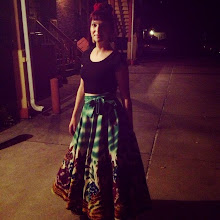The more I contextualize myself, the more irrelevant I feel. Perhaps I’ve made the mistake of reading too many contemporary short stories in internet journals lately—the forum in which I’ve been attempting to sound my voice. Loretta Lynn, along with other artists, writers, and musicians, shied away from listening to music by her contemporaries because she didn’t want to be influenced by them. But I wonder if being influenced is the true risk or if the true risk is contextualizing oneself into seeming irrelevance. Because I think I could. And then, egoless, how could I continue?
I heard on the radio once that people in the 18-24 age group (or thereabouts) generally have the strongest desire to leave their mark on the world. This is why young people—especially the disadvantaged—are often seduced by terrorist groups. It could also be why young people might join the military or the Peace Corps or try to become artists or writers. They turn to terror or service or creation to say simply: “I exist.” But I can’t think of that; I can only wonder at point that desire subsides. When does one accept her condition—her place in the universal problem of life, which is that humans are all just small, brief lives?
I talked with a dear friend who recently lost her husband. She started to cry because something happened and she thought, “I have to tell ___ that when I get home.” Her next thought was the reality of his death. I hugged her as she wept; I asked her if she tried writing him a letter. She said, “I talk to him every night.” It led me to wonder if perhaps our real relevance is in the context of those we love, the world we influence composed of little more than that, which is both infinitely more frightening and more reassuring.
Thursday, June 25, 2009
Subscribe to:
Post Comments (Atom)

No comments:
Post a Comment